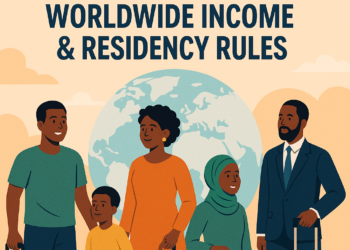In a recent development regarding the Netherlands’ immigration policy, the government has issued a significant update effective from September 4, 2023, concerning third-country nationals holding temporary residence permits in Ukraine. This update pertains to the Temporary Protection Directive (TPD) and will notably impact approximately 2,900 individuals residing in the Netherlands.
Under this new directive, once the temporary protection period for these individuals concludes, they will face two options. They can opt to initiate the asylum procedure within the Netherlands, a choice designed to facilitate those who genuinely require international protection. Alternatively, those not pursuing the asylum process will be required to leave the Netherlands within a strict timeframe of 28 days.
State Secretary Eric van der Burg explained the rationale behind this policy shift, emphasizing that the majority of third-country nationals who fled Ukraine can potentially return to their countries of origin without facing violence or persecution. This adjustment aligns with the government’s commitment to ensuring that individuals in genuine need of asylum receive appropriate protection.
Over the past few months, the Dutch Immigration and Naturalisation Service (IND) has initiated the review of asylum applications submitted by third-country nationals seeking to remain in the Netherlands. Two specific groups have been prioritized for examination: individuals from safe countries and those with compelling asylum claims from Yemen and Syria.
Notably, among the affected third-country nationals, approximately 700 have already expressed their intention to undergo the asylum procedure. Furthermore, individuals with asylum applications currently in progress or awaiting assessment will be systematically transferred to the Central Agency for the Reception of Asylum Seekers (AQA). This phased transfer process will commence six weeks before September 4 and continue for another six weeks thereafter.
For those who neither seek asylum nor receive approval for their asylum applications, the government has stipulated a 28-day timeframe from September 4 for them to leave the Netherlands. To support their return, the Repatriation and Removal Service (DT&V) offers financial assistance, while municipalities may provide temporary accommodation during this period.
It is essential to note that individuals who do not depart voluntarily will be considered as residing illegally in the country. Despite some third-country nationals having filed complaints against the IND’s decision to terminate their protection under the TPD, the Rotterdam court has initially ruled in favor of the government, deeming this termination legally enforceable.
For those who have initiated appeals against the decision, their temporary protection will also cease on September 4, unless the court intervenes to decide otherwise. This update marks a significant development in the Netherlands’ immigration policies, reflecting ongoing efforts to align asylum and protection policies with evolving circumstances.
For any enquiries please, email our editorial team at [email protected]. If you liked this story, kindly sign up for Clariform Newsletter, a handpicked selection of stories that helps you clarify things that matter and gives you clear signals about your world, delivered directly to your inbox.
Please subscribe to our YouTube channel, and join thousands of Clariform on Facebook, Twitter and Instagram.












